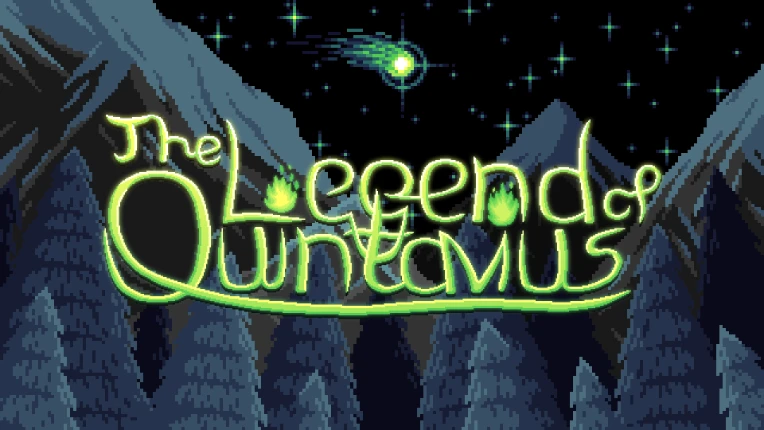
I’m finally releasing the soundtrack for The Legend of Quintavius, a whopping 28 songs. I have them scheduled to publish 2 songs a day, because I don’t want to bombard the audio portal, nor do I want it to take a full month to release.
It contains some of the oldest music I’ve ever written. Here’s the first sketch I made for the original theme, way back in 2020. It’s set up so that the last section loops.
Like with the rest of the game, I’ve been rewriting, rearranging, and redesigning the soundtrack for about 4 years. Just coming up with good titles and ordering the soundtrack itself the way I want has probably taken more time than it needed to. I have pages upon pages of Google documents filled with massive Beepbox links. And some of those early motifs are still in the soundtrack, while new ones were added over time as I learned how to compose, and what I wanted this soundtrack to be. It gradually developed from a handful of looping themes into an ensemble of leitmotifs arranged specifically for every scene. It sets the mood. Now the soundtrack in its entirety is about as long as the game is.
There’s even a theme that was first released for my mining game Subterranean, but which was originally written for The Legend of Quintavius. And then a couple themes originally for Subterranean that I brought over and remixed.
When I started working on the final version of the game one last time, when I decided to make it more artistic than anything, I had the idea to make the soundtrack more orchestral in nature. I wanted the chip waves to sound more like classical instruments, which would be fitting for an epic fantasy game.
The method I used to write songs and the limitations I gave myself are inspired by imagining that a real orchestra of musicians is playing my music. I pretended that each sound channel is a person, so I have 6 instrumentalists available, plus a drummer who plays on the 3 percussion channels. I also pretended that I only have one of each instrument, so in most cases I could only play one instrument on each channel. The piano, though, could have 2 channels because it can be played with both hands. And I also imagined that a few of my musicians could do vocals (which was really just an excuse for me to have extra 1/8th pulse waves).
Here’s the complete list of instruments I designed (not including sound effects).
- Vocals: 1/8th pulse wave with a soft transition
- Harmonica: 1/8th pulse wave with a soft transition, but instead used for shorter notes and motifs
- Piano: 1/8th pulse wave with a hard transition and decay
- Guitar: 1/8th pulse wave with a hard transition
- Violin: 1/8th pulse wave with a crossfade transition
- Cello: 1/4th pulse wave with a crossfade transition
- French horn: High pitch 1/4th pulse wave with a custom filter envelope to create that “swelling” sound
- Tuba: Low pitch 1/4th pulse wave with a custom filter envelope
- Bass clarinet: Square wave with a soft transition
- Woodwind: Triangle wave with a soft transition
- Drums: Retro/white noise with a hard or seamless transition, plus Beepbox’s drum synth preset
I also used a buzz noise during a couple of the dungeon themes, which I didn’t base on a real instrument, to create an entirely different feeling.
Some of my instruments also make use of vibrato, and in some cases I even have 2 different instruments, one with vibrato and one without, both playing the same motif. It creates a sound that I don’t really know how to describe, like they’re somehow in harmony and conflict with each other at the same time. There might be a musical term for it that I just don’t know.
I became fascinated with the concept of merging symphonic, orchestral music with chiptune, playing epic and complex themes with 8-bit instruments. I feel like a lot of chiptunes are written with fast-pacing and intricate motifs, because old video games only had a few sound channels to play and so needed to make up for the limitations, and I do really like that style of music.
But something I want to hear more of, and something I think is more my style, is chiptune with generally simpler motifs and pacing that’s slower or changes more often, something that really brings out the intrinsic quality of these digital instruments themselves. It’s a style I’m still refining myself, and something I think has the potential to be really powerful.
Is my soundtrack perfect? A masterpiece, even? Absolutely not. There’s already several things about it that I don’t like, and wish I’d spent more time trying to figure out how to do better or differently. But those flaws and imperfections just show that I’m a real musician still learning how to make music. There was a time when I thought Eclipsing Annihilation was a fluke and I’d never make a song as good as that. But I think this soundtrack is some of my best work, and I’m very proud of it. I hope you enjoy it.